FILTRATION SYSTEM
3P HYDROSYSTEM 1.000
For heavily used traffic areas
For metal roof surfaces.
For roof surfaces.
For lightly used traffic areas.
OVERVIEW HYDRSYSTEM / TECHNICAL DATA
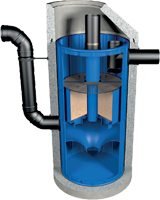
heavy traffic
FOR HEAVILY USED TRAFFIC AREAS
Connectable area full flow treatment
Category III in full flow*
500 m²
Qmax [l/s]**
5
Max. Nominal connection diameter DN
200

traffic
FOR LIGHTLY USED TRAFFIC AREAS
Connectable area full flow treatment*
750 m²
Qmax [l/s]**
7.5
Max. Nominal connection diameter DN
200

metal
FOR METAL ROOFS
Connectable area full flow treatment*
650 m²
Qmax [l/s]**
6.5
Max. Nominal connection diameter DN
200

roof
FOR ROOF SURFACES
Connectable area full flow treatment*
1,000 m²
Qmax [l/s]**
10
Max. Nominal connection diameter DN
200
* Internal bypass not included.
** Flow rate according to DIBt and LfU type approvals.
PLANNING CERTAINTY THROUGH APPROVALS
DIBT
APPROVAL
LFU METAL ROOF
APPROVAL
LANUV-LIST
NRW
VSA PERFORMANCE
AUDIT
EXTRACTION VIA
DWA-A 102
EXTRACTION VIA
DWA-M 153
EXTRACTION VIA
DWA-M 153
TENDER SPECIFICATIONS &
DRAWINGS
Request your
tender texts and
drawings!
PLANNING TOOLS
Individual, needs-oriented &
up-to-date information
BIM DATA
Building information modeling
(Building Information Modelling, BIM) for
the provision of 3D and 2D data,
tender texts and other
information for your construction projects.
YOU NEED PROFESSIONAL
SUPPORT OR
HAVE QUESTIONS FOR US?
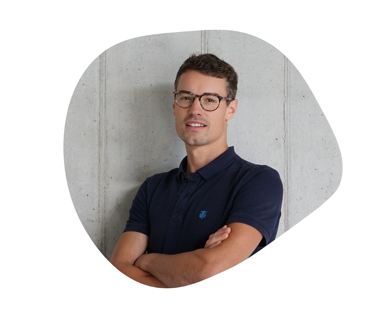
Jonas Bitterling, M. Eng.
Project Engineer
Tel +49 (0) 7334 92460-12
Mail bitterling@3ptechnik.de
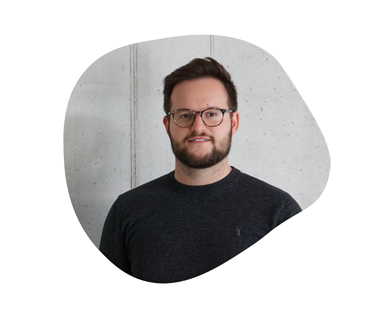
Daniel Betschner,
Master Professional of
Technical Management (CCI)
Project Engineer
Tel +49 (0) 7334 92460-32
Mail betschner@3ptechnik.de
REFERENCES
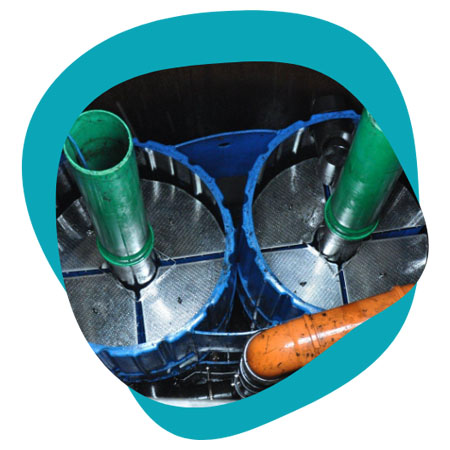
CITY OF HAMBURG
FEDERAL HIGHWAY
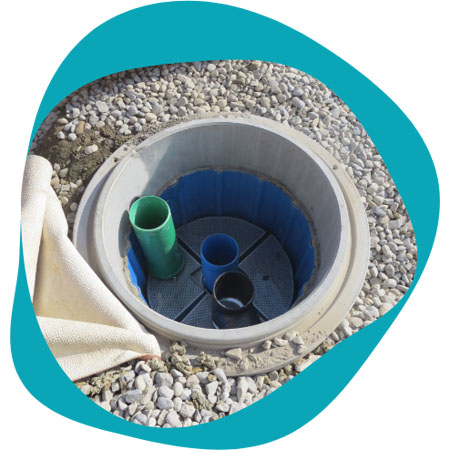
CITY OF CHAM
TRANSPORT JUNCTION
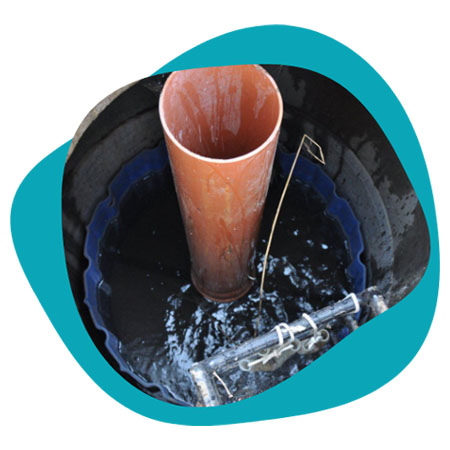
VIKING MUSEUM SCHLESWIG
LEAD ROOF
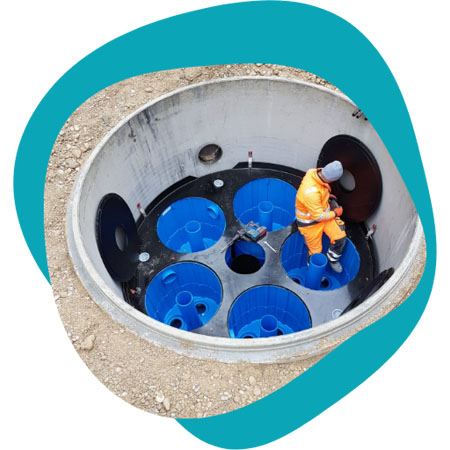
Munich Hospital
mixed TRAFFIC AREA
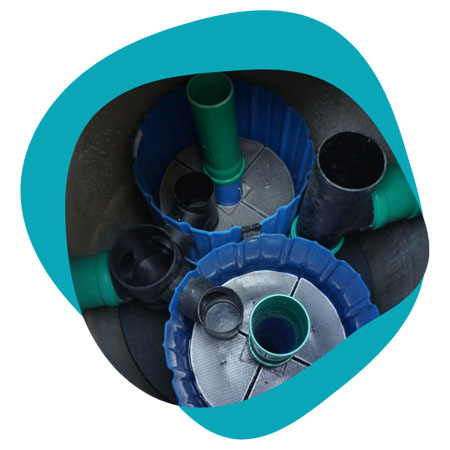
RETROFIT INFILTRATION SHAFT
Grünwald
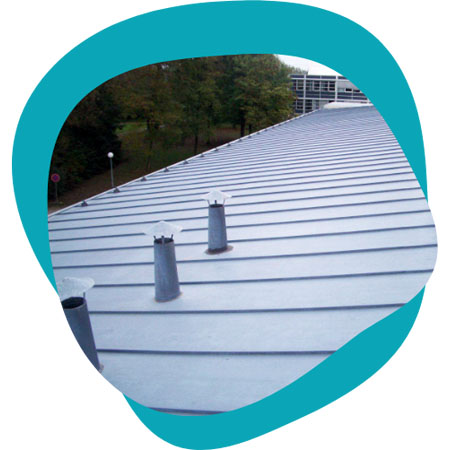
UNIVERSITY OF GARCHING
ZINC ROOF
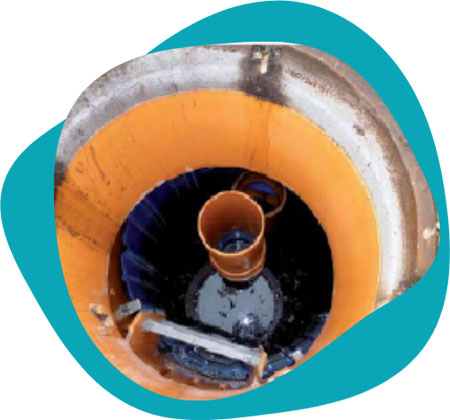
Königswinter
Research Project
FUNCTIONAL PRINCIPLE
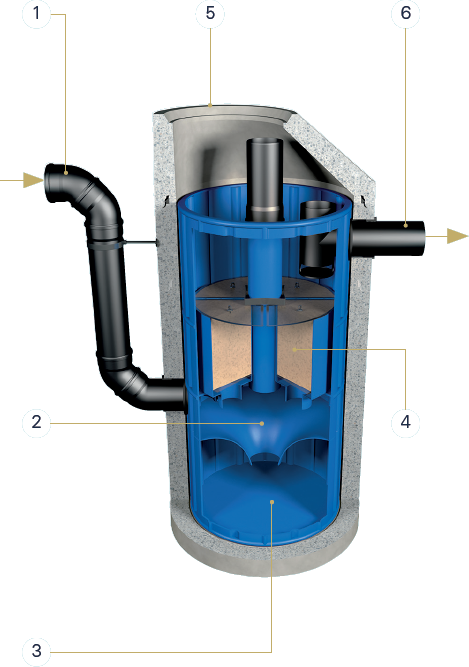
①
The stormwater from the area to be drained is discharged at the lower end of the shaft. The deflection aid deflects the water tangentially.
②
Here, the sedimentation of particles, especially of the sand fraction, takes place in a hydrodynamic separator due to turbulent secondary flows in a radial, laminar flow regime.
③
These are collected in a sludge trap under the system via an opening in the lower part of the manhole. The sludge trap is vacuumed out at intervals.
④
There are four filter elements in the middle of the cleaning shaft. This filters the fine particles using the upflow method and adsorbs a large proportion of the dissolved pollutants.
The filter can be backwashed from above and can be easily replaced if it becomes completely clogged.
⑤
The filter elements can be easily removed via the existing shaft opening.
⑥
The clean water is located above the filter elements. It passes through an oil barrier and then flows via the drain into the infiltration system or a surface water body.
HYDROSYSTEM 1.000
PROVEN QUALITY
The Hydrosystem 1.000 combines sedimentation processes with a filter stage. The rainwater is cleaned by sedimentation, adsorption, filtration and ion exchange.
A hydrodynamic separator causes the sedimentation of solids in a radial flow regime characterized by secondary flows. The effect of the separator causes the solids to enter the sludge trap, which is calmed by the flow breakers.
The four filter elements are located above the separator chamber. The water passes through the filter elements in an upflow process. The system removes pollutants such as heavy metals, mineral oil hydrocarbons and polycyclic aromatic hydrocarbons from the rainwater. It also binds nutrients such as phosphates. The quality of the purified water is so high that it can be discharged directly into the infiltration system or any receiving waters.
The height difference between the inlet and outlet is only 25 cm. As the system is installed under the traffic surface, it does not require any additional space on the property or in the street. The treatment system can be used for traffic areas such as parking lots and roads of all traffic loads, industrial areas and metal roofs. Four different filter cartridges are available for this purpose. The drain is equipped with an immersion pipe for light material retention. The sludge trap can be extracted via the central maintenance pipe.
FILTER VARIATIONS
heavy traffic
For heavily loaded
traffic areas.
metal
For metal roof surfaces

roof
For roof surfaces
traffic
For lightly loaded
traffic areas
Cleaning of rainwater runoff from
traffic areas, industrial areas and metal roofs.
Shaft system, no space required on the surface.
Low height offset.
Easy control and maintenance.
